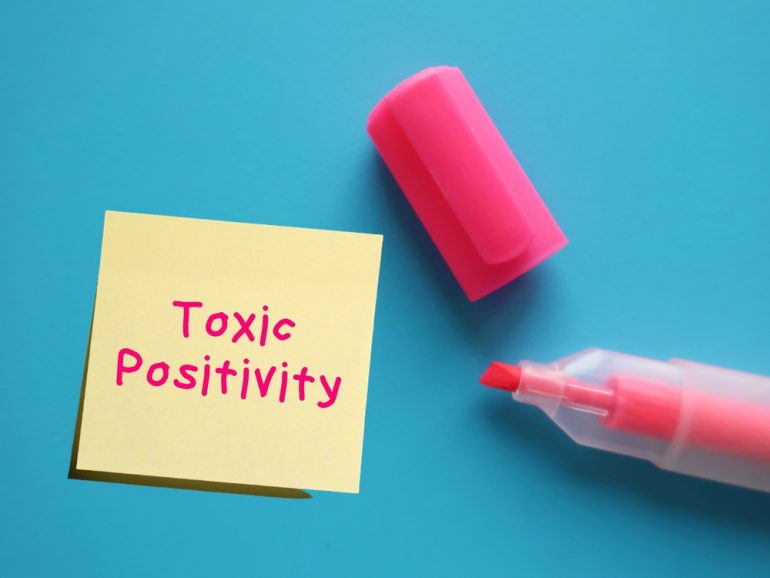What Is Toxic Positivity? How Does It Impact Our Mental Health?
Toxic positivity can disguise itself as well-meaning comments or suggestions. Have others tried to cheer you up by saying things like ‘just be positive’ and ‘you’ll get over it’?
Toxic positivity can disguise itself as well-meaning comments or suggestions, but they may only serve to make you feel as if your feelings and opinions do not have any weight.
According to mental health professionals, toxic positivity is an ineffective, excessive, and over-generalized happy or optimistic state across situations. That typically results in denial, minimalization, or invalidation of authentic human experiences and emotions.
It may mask all your doubts, fears, and worries with the thought that everything is okay, but sometimes, everything is not okay, and things need to be addressed.
How Toxic Positivity Impacts Mental Health
Although research shows that positive thinking can enhance well-being, anything in excess can become toxic and counter-productive. Here are a few ways how positivity can become toxic:
1) Masking Your True Feelings
Do you pretend to be okay when things are not? While occasionally putting your emotions aside to deal with them later is not a bad idea, it can become a problem if you consistently do so.
Masking our emotions for a long time can create a dissonance between who we are and what we are portraying to others. That can strain our relationships and make others around us feel like they don’t know who we are. Making a habit of masking your emotions till it becomes automatic or unconscious can lead you to lose touch with your feelings and possibly cause health issues.
For instance, research has shown that sometimes being optimistic is not enough to deal with major crise,s like the COVID pandemic. In essence, we realized that the threat was real, and we took action accordingly.
2) Isolation
We start to live inauthentically with ourselves and the rest of the world when we suppress our truth. We become disconnected with ourselves, which makes it challenging for other people to relate to and connect with us. While we may appear impenetrable from the outside, on the inside we may be yearning for a hug.
Have you ever been around someone who was overly sugary and encouraged you to ‘just think good thoughts’? How comfortable are you with expressing the intense feelings you experience in such a case?
Even though they may have the best of intentions, the individual is inadvertently conveying the message that only happy feelings are tolerated in their company. As a result, it gets challenging to convey anything other than positive vibes around them. That results in you behaving like they want you to, avoiding or suppressing your real feelings.
3) Confusion
Toxic positivity is invalidating and confusing at the same time. How some individuals simply disregard the ideas and feelings of others and categorize them as ‘good’, ‘bad’, ‘acceptable’ and ‘unacceptable’ is nearly perplexing.
Consider asking a doctor for assistance when you have a knee injury and describe your suffering. The doctor ends up advising you that talking about knee pain is ‘bad’ and how breathing exercises can help you feel better, rather than listening to you and giving you an ointment.
This is the level of confusion, invalidation, and aloofness one can experience when conversing with someone who always portrays toxic positivity as the solution to every issue.
Is It Okay to Not Be Okay?
Human beings experience a wide array of emotions, and each one is important to their overall well-being. Anger is a typical reaction to injustice or abuse, whereas anxiety, for instance, can alert us to a perilous circumstance or a moral qualm. Sadness may indicate the severity of a loss.
By denying these feelings, one also denies the potential for action these emotions require. Additionally, ignoring them won’t make them go away. Most people occasionally require assistance to handle their emotions. Simply allowing them to express their feelings aloud may lessen the impact of their emotiins and help them feel less ‘stuck’.
Research suggests that discussing emotions, especially negative ones, can help improve the way the brain processes them. Another study found that labeling and talking about emotions reduces the strength of certain brain pathways associated with negative emotions.
The finding suggests that talking about feelings may make you feel less overwhelmed. Therefore, we should understand that by masking our true feelings with toxic positivity, we may not experience well-being.
Takeaway
It’s natural for us to offer support when someone is going through a tough time. Instead of using phrases or words that encourage toxic positivity, you can comfort them by:
- What does this person need?
- Can I provide them with what is needed right now?
- How else can I help?
- Do they just want to be listened to and understood?
- Is what I want to say genuinely meant to soothe them or to soothe my discomfort?
By being mindful of ourselves during vulnerable moments with our friends and dear ones, we allow ourselves a better support system for them.

